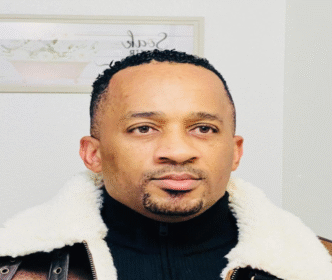The demand for intelligent, secure, and sustainable digital systems has never been greater. Across the United Kingdom, government and industry leaders are accelerating the adoption of cloud infrastructure, AI-driven automation, and digital services. Yet, amid this transformation, one question persists: how do we balance innovation with ethics, security, and human responsibility?
For Emmanuel Cadet, a U.S.-based Senior Software Engineer at Riot Games, the answer lies in precision, discipline, and purpose. Over a twelve-year career spanning banking, automotive, and gaming, Cadet has developed a philosophy that merges technical mastery with moral clarity. His research on AI-powered threat detection, blockchain in banking, and cloud optimization continues to inform global debates on digital transformation.
In this conversation with TechAnnouncer, Cadet speaks about his evolution from building banking systems in Haiti to leading AI and cloud initiatives in the United States, and how his experience offers critical lessons for the UK’s own digital future.
Q: Emmanuel, you’ve built a diverse career that spans multiple industries and continents. How would you describe your journey so far?
I started my career at Sogebank in Haiti as a Programmer Analyst. It was an environment where precision mattered, but so did creativity. We had to make systems work efficiently despite limited infrastructure. That experience built my foundation in financial systems, data integrity, and resilience. Over time, I took on leadership roles and became Director of Technological Control and Business Continuity Planning. It was my first real exposure to managing people, risk, and strategy, all through the lens of technology.
When I moved to the United States, I transitioned into environments that demanded scalability. At Ford Motors, I worked on microservices for autonomous vehicles. Later, at Riot Games, I focused on systems that support millions of users globally. These transitions taught me that software engineering is universal, but its challenges evolve. In Haiti, the problem was resource scarcity. In the U.S., it’s system complexity. In both, success comes down to design discipline and a commitment to continuous learning.
Q: The UK is investing heavily in AI and cloud migration. What lessons from your experience could help British organizations succeed in these areas?
The UK is on the right path, especially with its National AI Strategy and its commitment to secure cloud infrastructure, but technology alone doesn’t guarantee success. Sustainable transformation happens when culture, process, and skills evolve together.
At Ford, we migrated complex systems from Pivotal Cloud Foundry to Google Cloud Platform. That effort went far beyond code refactoring, teams had to rethink deployment models, automation, and ownership. We introduced policy-as-code, automated testing, and continuous integration to reduce manual intervention and operational risk. It proved that cloud migration is as much a cultural shift as a technical one.
At Riot Games, I had a similar lesson working on large-scale services deployed on AWS. One of the systems I helped build and maintain, the Publishing Content Service, serves game and product content to all Riot websites, mobile apps, and desktop clients across Windows and macOS, reaching millions of players globally. Operating at that scale required disciplined DevOps practices: automated CI/CD pipelines, infrastructure-as-code, AWS-based monitoring and alerting, strict deployment governance, and rollback strategies to protect uptime. We learned that reliability in the cloud isn’t accidental, it’s engineered through repeatable processes, testing, and operational accountability.
For UK institutions, especially in healthcare, government, and financial services, the same principle applies. Cloud migration shouldn’t be seen as simply relocating systems; it should be treated as modernization. The organizations that succeed will invest in governance, skills development, and automation. For example, NHS or public-sector services could benefit from CI/CD pipelines that enforce compliance and security checks before every deployment. You cannot build digital trust without structure, transparency, and disciplined operations.
Q: Your research on AI-powered threat detection feels timely for the UK, given recent cyberattacks on financial and public institutions. Can you explain its relevance?
Absolutely. The UK faces similar threats as the U.S., ransomware, phishing, and data exfiltration attacks targeting both private and public sectors. One of my research papers focused on a real-time AI framework for security surveillance. Instead of relying on fixed rules, the system learns patterns from normal activity and flags anomalies instantly.
For example, in a UK context, such frameworks could secure critical infrastructure, from airports and hospitals to energy grids. The goal isn’t just reaction but prediction. Cybersecurity must become proactive, adaptive, and data-driven.
There’s also a workforce dimension. The UK has an estimated 11,000-person cybersecurity talent gap. AI systems can help fill that void by automating early threat detection and triage, freeing human analysts to focus on higher-level decision-making. Collaboration between AI systems and experts can raise both efficiency and accuracy.
Q: You’ve worked extensively with microservices and API gateways. How do these architectures support modernization efforts in the UK’s public sector?
Microservices fundamentally change how organizations scale and deliver digital services. They’re modular, resilient, and secure, exactly what the UK’s “Digital by Default” agenda and programs like One Login for Government require. Instead of one massive system where every change introduces risk, microservices allow each capability, tax processing, healthcare records, licensing, payments, to operate independently, yet communicate securely through APIs. That’s how you gain agility without compromising compliance or security.
At Ford, we saw this firsthand during the migration away from monolithic platforms. We decomposed large applications into smaller, independent services, each owning its data, deployment pipeline, and runtime. The result was better scalability, improved fault isolation, and faster delivery cycles. A failure in one service no longer meant a failure in the entire system, something that’s critical in public services where uptime directly affects citizens.
At Riot Games, the same principles operate at global scale. The Publishing Content Service, built as a microservice ecosystem running on AWS, delivers content to all Riot websites, mobile apps, and desktop clients across Windows and macOS, serving millions of users worldwide. Each service has its own API, deployment lifecycle, and monitoring, allowing teams to ship changes quickly without impacting other parts of the platform. API gateways provide secure routing, authentication, throttling, and regional control, key requirements when operating across multiple countries and compliance environments.
This model holds powerful lessons for the UK public sector:
- Modernization without disruption: Services can migrate one domain at a time instead of risking a full systems overhaul.
- Resilience by design: If one service fails, others stay operational, critical for healthcare, benefits, and emergency systems.
- Security and compliance built into the architecture: API gateways enforce authentication, logging, rate limits, and data policies consistently.
- Faster innovation cycles: Teams can deploy updates independently, rather than waiting on slow, centralized release schedules.
The takeaway: microservices aren’t just a technology pattern, they are an operational strategy. For government agencies, NHS systems, and public finance platforms, they offer a path to modernize safely, incrementally, and sustainably, while delivering faster, more reliable services to the public.
Q: You also have a background in fintech and blockchain. How do your experiences align with the UK’s financial innovation goals?
Both the U.S. and UK share a strong fintech ecosystem. In my research on blockchain applications in banking, we explored how distributed ledgers enhance transparency and security. In regions like London, which remains Europe’s financial hub, blockchain can reinforce regulatory compliance and streamline cross-border payments.
For example, in Haiti’s banking sector, interoperability between systems was a constant challenge. Blockchain solved that by offering shared, tamper-proof records. In the UK, it could help reduce fraud, improve identity verification, and simplify reporting under the Financial Conduct Authority’s frameworks.
The future of finance lies in secure collaboration, systems that communicate reliably across borders while meeting strict data protection laws. Blockchain, if implemented responsibly, provides that foundation.
Q: Ethical AI is a major theme in the UK’s technology strategy. How do you integrate ethics into your own engineering process?
Ethical AI isn’t optional, it’s fundamental. I apply privacy-by-design principles to every project. That means building in encryption, anonymization, and consent control from the start. You don’t add ethics at the end; you code it in.
For instance, in one of our chatbot projects, user data was aggregated and anonymized before training. That prevented bias and preserved trust. Ethical AI also requires transparency, users should understand what data is collected and how it’s used.
The UK’s AI Regulation White Paper stresses fairness and accountability. Engineers must internalize those values. It’s not about compliance for its own sake, it’s about maintaining public confidence. When users lose trust, systems fail, no matter how advanced the technology.
Q: You’ve led teams in high-performance environments. What leadership lessons can UK tech organizations draw from your approach?
Leadership is about clarity, not control. At Riot Games, we emphasize autonomy and mentorship. Developers own their work but collaborate within a shared framework of standards. We hold peer review sessions, technical retrospectives, and “failure postmortems.” These build trust and accelerate learning.
For UK organizations facing a digital skills shortage, mentorship is essential. You can’t close the skills gap by hiring alone, you must grow talent internally. Encourage senior engineers to teach. Reward mentorship as much as code delivery.
Leadership also requires emotional intelligence. Engineers are creative problem-solvers, not cogs. When you give them purpose and respect, they produce excellence.
Q: Continuous learning seems central to your philosophy. How do you stay ahead of such a fast-changing field?
Discipline and structure. Every year, I set clear learning milestones, new frameworks, certifications, or research projects. My Google Cloud and AI certifications gave me both technical rigor and broader perspective.
But learning shouldn’t be confined to credentials. I contribute to open-source projects, engage with developer communities, and attend conferences. You learn most by teaching and collaborating.
For UK engineers, I’d emphasize accessibility. Training and certification programs should be supported by government and industry partnerships. Platforms like Coursera, edX, or AWS Academy could be integrated into workforce development plans. That’s how you democratize skill acquisition.
Q: The UK is committed to reaching Net Zero by 2050. How does your work in cloud optimization support sustainable technology?
Sustainability and performance go hand in hand. In my research on sustainable cloud systems, we measured how architecture design affects energy consumption. Inefficient APIs and idle compute cycles waste resources. By optimizing microservices, using serverless computing, and implementing load balancing, we reduced energy usage without losing performance.
For UK firms, this approach can support green computing goals. Cloud providers now offer carbon dashboards, developers must use them. Software efficiency should be treated as environmental responsibility. The less power your application consumes, the greater your impact.
Sustainability is not a side goal, it’s the next evolution of software quality.
Q: You’ve worked in both public and private sectors. How do these environments differ in their approach to innovation?
The private sector prioritizes speed and scalability. The public sector emphasizes compliance and continuity. Both are valuable.
The key is synergy. Public institutions can learn agility from startups, while startups can learn accountability from government frameworks. In the UK, partnerships between academia, industry, and government, like those under UK Research and Innovation (UKRI), are already fostering that balance.
Innovation thrives when guardrails are clear and collaboration is genuine.
Q: The UK faces a shortage of skilled engineers. What solutions would you propose?
Talent development must become systemic. Apprenticeships, micro-credentials, and international collaborations should all be part of the solution.
For instance, the UK could partner with U.S. firms to run virtual mentorship programs or joint R&D fellowships. When global experts share case studies and codebases, everyone benefits.
I also believe in hands-on training. Universities should integrate project-based learning, not only theory. Engineers learn by building, breaking, and fixing. The next generation must see technology as both a craft and a responsibility.
Q: What advice do you give to young engineers starting their careers?
Focus on fundamentals. Frameworks change every few years, but principles don’t. Learn data structures, algorithms, and system design. These are the bedrock of everything you’ll build.
Write clean, documented code. Always test. Ask why, not just how. And remember, your reputation is built on reliability. People remember engineers who deliver, not those who promise.
Finally, don’t fear collaboration. Great engineering happens when smart people share ideas without ego.
Q: Looking ahead, how do you see AI reshaping the engineering profession in the next five years?
AI will redefine what engineers do, not replace them. Tools like ChatGPT, Copilot, and DeepMind’s AlphaCode, Windsurf, Cursor, Bolt automate repetitive coding, freeing humans to focus on strategy, security, and ethics.
The engineer of the future will be part developer, part data scientist, part ethicist. The UK should embrace that model by integrating AI literacy into education. Every computer science student should understand model transparency, bias mitigation, and governance frameworks.
The future belongs to engineers who understand both the algorithm and the impact.
Q: You’ve collaborated with researchers like Abel Uzoka and Pascal Ojukwu. How do such collaborations expand your vision?
Collaboration keeps you grounded. Working with academics from Africa, North America, and Europe exposed me to diverse perspectives. In our paper on AI-powered chatbots, for example, we combined different cultural approaches to customer engagement.
This diversity strengthens design thinking. When you collaborate across borders, your models become more inclusive, and your systems more resilient. I believe UK institutions can benefit from similar international partnerships, building AI systems that reflect global ethics and cultural sensitivity.
Q: Finally, what drives your mission as an engineer and researcher?
I see engineering as a moral duty. Every line of code affects people’s lives. My mission is to build systems that are intelligent, secure, and sustainable. That means protecting users, enabling innovation, and ensuring longevity.
I also believe collaboration is key. Technology shouldn’t be built in isolation. The UK’s openness to international expertise sets an example. When nations share knowledge, progress accelerates.
My philosophy is simple: security, scalability, sustainability. That’s how we build systems that last.
Closing Reflection
Emmanuel Cadet’s career is a blueprint for the global engineer, technically precise, ethically grounded, and relentlessly curious. His journey from Haitian banks to U.S. tech giants illustrates how discipline, mentorship, and cross-border collaboration can drive sustainable innovation.
For the United Kingdom, his story carries a message of optimism. As the nation refines its National AI Strategy, builds cybersecurity resilience, and nurtures its next generation of developers, insights from professionals like Cadet show that the future of engineering depends not only on technology, but on integrity, inclusion, and shared purpose.
Progress, as Cadet reminds us, is not measured by code alone, but by the communities and systems that code empowers.












